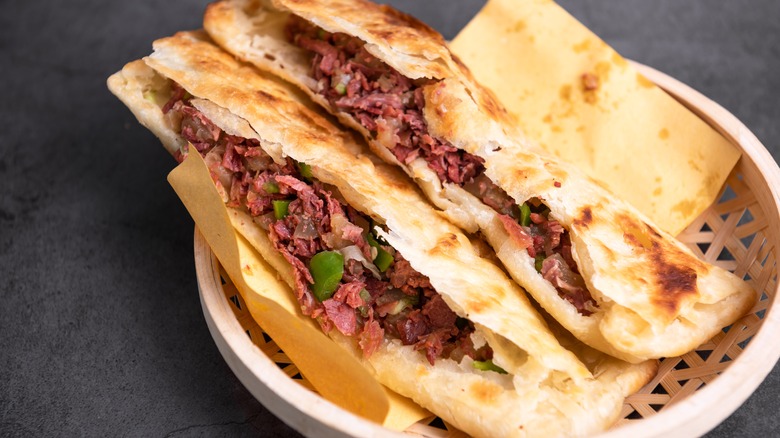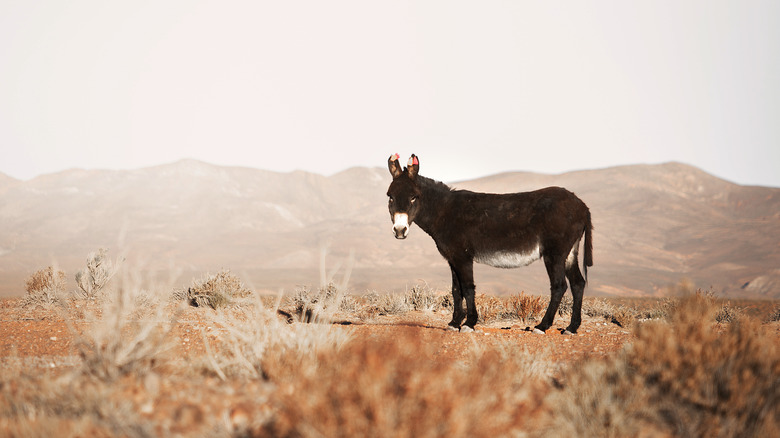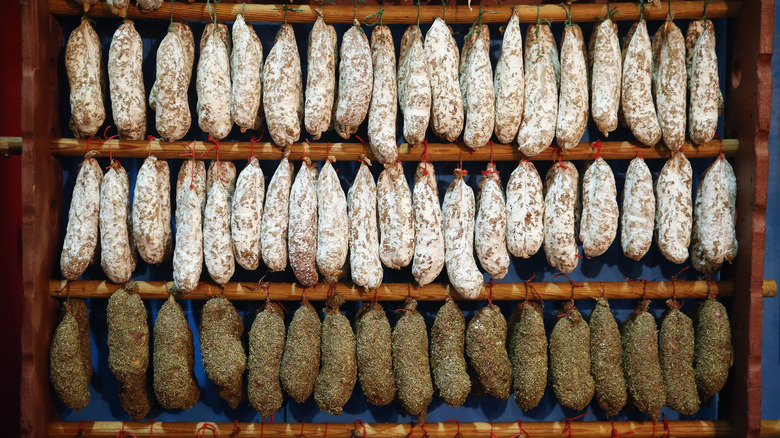China's Donkey Burgers Double As A Fine Dining Delicacy And Street Food Star
In northeastern China, just outside Beijing, you can find restaurants that sell a food item unique to the region: donkey burgers. Made with slow-cooked donkey meat, fat, and green peppers stuffed into a crispy flatbread not dissimilar to pita, the donkey burger bears a closer resemblance to a pulled pork sandwich than its namesake. The sandwich's origin is disputed, but two cities in Hebei province currently claim the donkey burger as their own. Hejian, which was declared the official birthplace of the sandwich by the China Hotel Association, has hosted a donkey burger festival every year since 2017.
Aside from donkey burgers, you can find donkey in other dishes as well as traditional folk medicine. Donkey meat and offal can be made into a wide variety of dishes, with specialty restaurants serving every edible part of the animal. According to enthusiasts, the meat tastes like a cross between chicken and pork, with a tender texture due to the slow cooking process. Meanwhile, donkey skin is used in traditional Chinese medicine by boiling it and extracting its gelatin. The resulting substance, known as ejiao, is believed to be a cure for everything from baldness for men to menstrual distress for women.
Donkey as food in Chinese history
Long known as a beast of burden, the donkey has a long history of working with humans. First domesticated in East Africa approximately 5 millennia ago, the animal has since been accompanying humans to all corners of the world. While it was not known when donkeys became livestock to breed for food, the consumption of donkey meat has a long history in China.
According to researchers, donkey has been consumed in China since at least the Ming dynasty, which ruled China between the 14th and 17th centuries. Donkeys were believed to be first consumed as food due to necessity, resulting from food shortages during a civil war between the Ming emperor and one of his uncles. Unwilling to slaughter valuable horses, the people turned to the donkey for meat instead. However, although it was hunger that drove the Chinese people to consume donkey in the first place, they have since held the meat in high esteem, comparing it to the mythical dragons using the folk saying, "In heaven, there is dragon meat; on earth, there is donkey meat."
Donkey consumption and shortage
While you are not likely to encounter donkey meat in your local supermarket, it is not as uncommon as you think. In Europe, donkey is eaten as charcuterie and in stews in France and Italy. In Sonora state in Mexico, locals consume dried donkey meat rehydrated and rolled into a tortilla. Meanwhile, the soaring popularity of donkey meat in China, along with the animal's slow gestation period and the fact that fewer families are raising them, has caused a donkey shortage in the country. While the problem is alleviated by importing donkeys from Africa, the widespread slaughter of donkeys has caused its population to plummet across the continent.
Aside from being delicious, donkey meat is actually pretty valuable in terms of nutrition. As a lean meat, it is low in saturated fat and rich in healthy Omega-3 fatty acids. If you wish to try donkey meat for yourself, you might want to search for a specialty supplier online.



